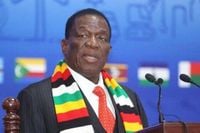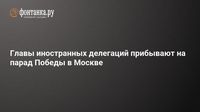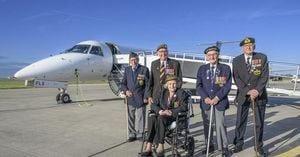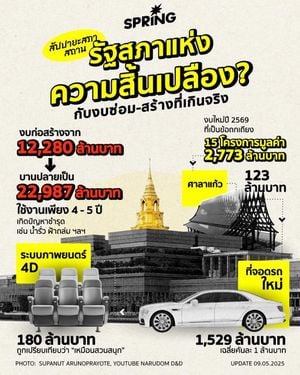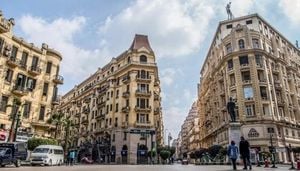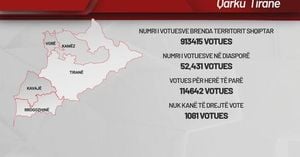As the world commemorates the 80th anniversary of Victory Day, Moscow has transformed into a hub of international diplomacy, drawing leaders from across the globe for a series of significant events. On May 9, 2025, the Kremlin hosted a festive lunch for heads of state and top officials, showcasing a menu rich in Russian culinary tradition.
Guests were treated to an array of dishes, including a unique salad featuring crab and strawberries, dumplings filled with sturgeon and pike caviar, and hearty borscht with veal. For those with a taste for seafood, a creamy elk ear was also on offer. Before the main course, diners enjoyed sherbet made from cloudberries, a delightful prelude to the meal. The main course featured options such as halibut fillet, venison medallions with mushrooms, or caramelized duck served with asparagus. The meal concluded with a classic apple pie complemented by vanilla ice cream and accompanied by fine Russian wines, including a white Crimean 'Blanc de Noirs' and a red Kuban 'Kazak Krasnaya Gorka'. The menu was meticulously crafted starting in January, with tastings conducted just before the celebration.
The gathering included representatives from numerous countries, such as Armenia, Belarus, Kazakhstan, Kyrgyzstan, Tajikistan, Turkmenistan, Uzbekistan, Abkhazia, Bosnia and Herzegovina, Brazil, Burkina Faso, Venezuela, Vietnam, Guinea-Bissau, Egypt, Zimbabwe, China, Congo, Cuba, Mongolia, Myanmar, Palestine, Serbia, Slovakia, Equatorial Guinea, Ethiopia, and South Ossetia. Notably absent were the leaders of Azerbaijan and Laos; the Azerbaijani president had to attend to internal matters, while the Laotian leader was unable to travel due to a severe case of coronavirus. High-level delegations from India, Nicaragua, and South Africa were also present.
The Victory Day parade, a highlight of the celebrations, will feature military units from 13 countries, including Azerbaijan, Vietnam, Belarus, Egypt, Kazakhstan, China, Kyrgyzstan, Laos, Mongolia, Myanmar, Tajikistan, Turkmenistan, and Uzbekistan. Veterans from various nations, including Armenia, Israel, Mongolia, and the United States, are set to participate, adding an element of historical significance to the event.
The day’s program commenced with Russian President Vladimir Putin welcoming foreign delegations on the morning of May 9. Following the parade, a solemn wreath-laying ceremony at the Tomb of the Unknown Soldier is scheduled, along with a photo session and a reception at the Kremlin. During this reception, Putin will engage with leaders who may not have time for separate meetings, emphasizing the importance of these international connections.
Yuri Ushakov, an aide to the President of Russia, highlighted the significance of this celebration, stating that it serves as a major international event that underscores Russia's influence in the global community. He remarked, "The celebration of the 80th anniversary of the Great Victory is becoming perhaps the largest international event, and this is an indicator of Russia's growing authority in the world.”
In the days leading up to the main event, leaders continued to arrive in Moscow. Among them were Zimbabwe’s President Emmerson Mnangagwa, who is expected to attend the parade, and Guinea-Bissau’s President Umaru Sissoku Embalo. The President of the Republic of Srpska, Milorad Dodik, and Ethiopia’s President Taiye Atske-Selassie were also welcomed in the capital. Additionally, high-profile arrivals included the President of Serbia, Aleksandar Vucic, the President of Mongolia, Ukhnaagiin Khurelsukh, and China’s Chairman Xi Jinping.
As the festivities unfolded, the Kremlin prepared to receive foreign leaders with traditional honors, including an honor guard and orchestra. Delegates were presented with copies of the historic Pravda newspaper from May 10, 1945, a gesture that symbolizes the enduring legacy of Victory Day.
With over 150 diplomatic missions accredited in Russia, the event has drawn significant attention from international media and observers, highlighting the importance of the day not just for Russia, but for the global community commemorating the end of World War II.
The military parade is set to begin at 10:00 AM, followed by the wreath-laying ceremony at approximately 11:15 AM. As the day progresses, a reception for foreign dignitaries will commence around noon, where Putin will have the opportunity to engage with attendees in a less formal setting, fostering dialogue on various global issues.
Ushakov emphasized that despite the ongoing tensions with Western nations, Russia has successfully organized large-scale international events, showcasing its ability to maintain a prominent position on the world stage. The celebrations not only honor the sacrifices made during the Great Patriotic War but also reflect Russia's aspirations to strengthen its diplomatic ties and showcase its cultural heritage.
As the world watches, the events in Moscow serve as a reminder of the enduring impact of history and the importance of international cooperation in addressing contemporary challenges. The Victory Day celebrations, steeped in tradition and significance, provide a platform for dialogue and unity among nations.
